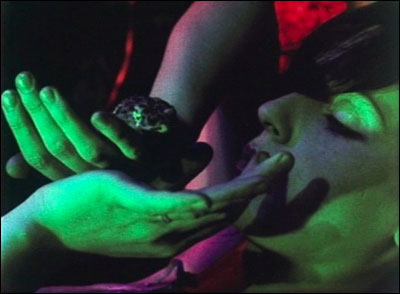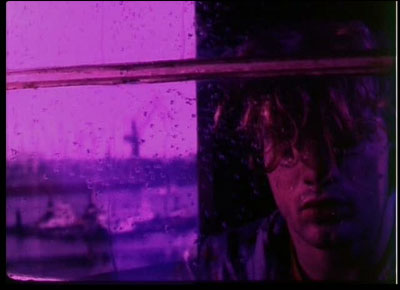Industrial Culture Handbook: The Movie!
That might as well be the title of Decoder, a German film that came out in 1984. Unreleased in the United States and forgotten until the Internet recovered it in recent years, Decoder is a fascinating relic of the early industrial ethos.
Written by Klaus Maeck, directed by Jürgen Muschalek, and based on The Electronic Revolution by William S. Burroughs, the film focuses on a lone audiophile who discovers that multinational corporations are controlling populations through muzak. By playing the mind-controlling, sedative non-music in elevators, fast food joints, lobbies and stores all over the country, corporations such as the evil H-Burger are able to produce a docile population of consumers. To combat this, our protagonist turns to industrial noise, and inspires a legion of “cassette terrorists” to covertly swap muzak tapes for sounds that are much more subliminally sinister, inciting riots all over Germany.

The film’s score was a collaboration between F.M. Einheit (Einsturzende Neubauten) and Dave Ball (Soft Cell), with contributions from Genesis P. Orridge and Alexander Hacke. In addition to scoring, F.M. Einheit, a.k.a Mufti, also plays the film’s protagonist. Other characters include cult film actor, scholar and artist Bill Rice, playing a sad-faced security official on a mission to foil the cassette terrorists’ plot, and inadvertent heroin-chic style icon/musician Christiane Felscherinow, playing an amateur herpetologist/go-go dancer who looks eerily similar to Rooney Mara’s Liz Salander. Cameo appearances include Genesis P. Orridge and William S. Burroughs. The film is sprinkled with many other references to items you might find in a 1980s-era RE/Search publication, such as the appearance of a Brion Gysin Dreamachine inside a secret nightclub belonging to an industrial cult, as well as a giant Survival Research Laboratories logo on the wall of the protagonist’s studio.

One of the film’s most stunning features is the color palette. “Lensed by Johanna Heer,” writes Samantha Anne Scott, “the film’s blunted, monochromatic color schemes — primarily red, green, and CRT blue — demarcate character, mood, and motivation … while doused with art house affectation, Decoder delineates a relatively cohesive narrative of corporatism, control, and the power of noise.” The full film is posted above.
[via wobbly]

February 27th, 2012 at 5:42 pm
No credits for the writer and director, Klaus Maeck and Jürgen Muschalek?
February 27th, 2012 at 6:52 pm
Aha! Thanks for bringing that oversight to our attention, John. Nadya’s on the go, but has instructed me to add ’em in. Cheers!
February 27th, 2012 at 8:06 pm
Wow, I’m sure I would have watched the *hell* out of this if I saw it when I was 14, but apparently now my attention span is even shorter than it was then… does anything ever *happen* in this movie?
February 28th, 2012 at 1:41 am
Oooh, sounds delish! Downloading for later delectation…
February 28th, 2012 at 1:00 pm
Fun. For more “movies about electronic music” YouTube fun, I’d recommend “BBC Synth Britannia”: http://www.youtube.com/watch?v=69Wjc6QYuKI
Covers the rise of early punk/electronic music crossovers, Throbbing Gristle, and many others.
May 13th, 2012 at 6:48 pm
Thanks for this! I didn’t even know about it, even as a Neubauten and 80’s industrial subculture fan.
July 3rd, 2012 at 11:13 pm
We re-issued this film on DVD with a load of bonus features like the original soundtrack, commentaries, etc. It’s available on Amazon.com or Mobilization.com/index2.html.